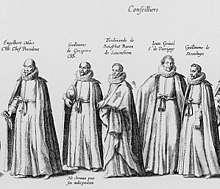Brussels Privy Council
The Privy Council or Secret Council (Dutch: Geheime Raad, French: Conseil Privé) in Brussels was one of the three "collateral councils" (along with the Council of Finance and Council of State) that together formed the highest government institutions of the Habsburg Netherlands.[1] It was particularly charged with legal and administrative questions.[2]

Privy Councillors Engelbert Maes, Guillaume de Grysperre, Ferdinand de Boisschot, Jean Grivel and Guillaume de Steenhuys in the funeral cortege of Archduke Albert (1622)
History
The Council was founded on 1 October 1531 by Emperor Charles V.[3] He prescribed a president, eight councillors, and a secretary.
Philip V of Spain abolished the council in 1702, but it was later restored by the archduchess-governess Maria Christina, Duchess of Teschen and finally abolished by the Brabant Revolution.
Personnel
Presidents
- 1531-1540: Jean Carondelet.
- 1531-1540: Pieter Tayspil
- 1540-1548: Lodewijk van Schore
- 1549-1569: Viglius van Aytta
- 1569-1573: Charles de Tisnacq
- 1573-1575: Viglius van Aytta
- 1575-1583: Arnoud Sasbout
- 1587-1592: Willem van Pamele
- 1592-1595: Jan van der Burch
- 1597–1609: Jean Richardot
- 1614–1630: Engelbert Maes
- 1632–1653: Pierre Roose
- 1653–1671: Charles de Hovyne
- 1672–1684: Léon-Jean de Paepe
- 1684-1694: Pierre-François Blondel
- 1694-1702: Albert de Coxie, baron of Moorsele.
- 1725-1732: Christophe-Ernest, 1st Count of Baillet
- 1733-1739: Jean Alphonse, 1st Count de Coloma
- 1739-1758: Gilles-Augustin de Steenhault
Councillors
Secretary
gollark: In an individual interaction, vengeance is bad, because you're just harming someone even though doing it afterward won't cause them to have not done the thing for which you are taking revenge.
gollark: Which kind of works even if you haven't taken vengeance on *anyone* yet, if people *think* you are likely to.
gollark: As I said, if people know "hmm yes if I do bad things to this person they will have VENGEANCE" they are less likely to do those bad things.
gollark: Or I guess not even in that weird way.
gollark: > vengeance is a vicious cycle and doesn't actually help anyoneAh, but it *does*, acausally speaking in some confusing way.
See also
- Council of Brabant
- Council of Flanders
- Council of Luxembourg
- Council of Troubles
- Great Council of Mechelen
- Supreme Council of Vienna
- Supreme Council of Flanders
- Brussels Council of State
References
- Paul F. State, Historical Dictionary of Brussels (2015), p. 393.
- Georges Martyn, "How 'Sovereign' were the Southern Netherlands under the Archdukes?", in The Twelve Years Truce (1609): Peace, Truce, War and Law in the Low Countries at the Turn of the 17th Century, edited by Randall Lesaffer (Leiden and Boston, 2014), p. 201.
- Geheime Raad (1531-1578), Huygens Institute for the History of the Netherlands. Accessed 3 April 2017.
This article is issued from Wikipedia. The text is licensed under Creative Commons - Attribution - Sharealike. Additional terms may apply for the media files.